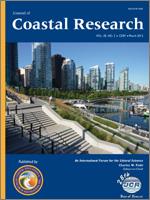GAO, J.; BAI, F.; YANG, Y.; GAO S.; LIU, Z., and LI, J., 2012. Influence of Spartina colonization on the supply and accumulation of organic carbon in tidal salt marshes of northern Jiangsu Province, China.
Two species of cordgrass (Spartina anglica Hubbard and Spartina alterniflora Loisel.) were artificially introduced to the intertidal zone of Jiangsu Province, China, in 1963 and 1982, respectively. However, as alien species, the impact of Spartina on the tidal flat ecosystem remains largely unknown. Suaeda salsa and Phragmites australis, two native plants in the intertidal zone of northern Jiangsu Province, China, are C3-type plants, whereas the Spartina species are C4-type plants. In this article, we investigate the vertical distribution of total organic carbon, total nitrogen, and organic carbon isotope ratios in different ecosystems associated with the northern Jiangsu tidal flats; analyze changes in the organic carbon sources in the tidal flat sediments after Spartina colonization; compare carbon burial patterns at different evolutionary stages in the tidal flats; and discuss the effects of Spartina on organic carbon cycling over the intertidal flats on the Jiangsu, China, coast. Before the introduction of Spartina, the organic material in the intertidal sediments of the study area mainly came from a combination of marine and C3 plants. After the introduction of Spartina, the contribution of S. alterniflora to the organic carbon content in the salt-marsh strata exceeded those made by marine sources and other C3 plants. On the S. anglica flat, the quantity of organic carbon originated from S. anglica was lower than from S. alterniflora but was still greater than the contribution made by native C3 plants. The introduction of Spartina not only had a significant effect on primary productivity throughout the tidal flats but also enhanced the organic carbon accumulation rate in the sediment.





